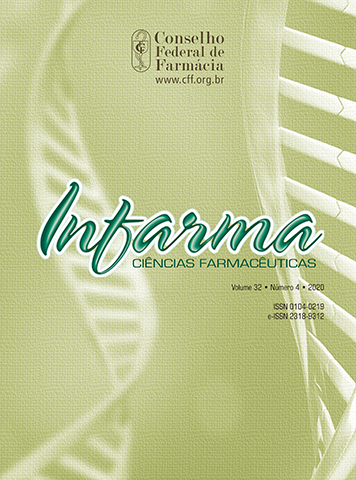MICROBIOLOGICAL QUALITY OF MINAS TYPE CHEESES MARKETED IN BELO HORIZONTE, MG, BRAZIL
DOI:
https://doi.org/10.14450/2318-9312.v32.e4.a2020.pp344-352Keywords:
Staphylococcus aureus, Salmonella sp., thermotolerant coliformsAbstract
This study evaluated the microbiological quality of Minas cheeses commercialized in Belo Horizonte, MG, Brazil. We used eighteen cheese samples, nine of industrialized Minas frescal type marketed on supermarkets, and nine of the Minas artisanal type marketed in the County market. The temperatures of the cheese samples were measured during the exposure phase for sale. The hygienic-sanitary quality of cheeses was evaluated by counting coliforms at 45 °C, coagulase-positive Staphylococcus, and Salmonella sp. It was verified that eight (88.9%) samples of industrialized Minas frescal cheese were at temperatures higher than allowed at the retail market, and 100% of the artisanal samples were exposed in inadequate temperatures. Two (22%) samples of industrialized Minas cheese and four (44%) samples of artisanal cheeses presented higher counts than those recommended by the legislation for coliforms at 45 °C. Concerning the coagulasepositive Staphylococcus, 100% of the samples of both, industrialized and artisanal cheese, presented a higher amount than the legal standards. All analyzed samples showed contamination by Salmonella sp. It was concluded that the hygienic-sanitary quality of the 100% Minas cheese evaluated was unsatisfactory and not safe for use.
Downloads
Published
How to Cite
Issue
Section
License
Authors who publish in this journal agree to the following terms:
- Authors retain the copyright and grant the journal the right of first publication, with the work simultaneously licensed under the Licença Creative Commons Attribution which allows the sharing of work with acknowledgment of authorship and initial publication in this journal.
- Authors are authorized to take additional contracts separately, for non-exclusive distribution of the version of the work published in this journal (e.g. publish in institutional repository or as a book chapter), with acknowledgment of authorship and initial publication in this journal.
- Authors are allowed and encouraged to publish and distribute their work online (e.g. in institutional repositories or on their personal page) at any point before or during the editorial process, as this can generate productive changes as well as increase the impact and Citation of published work (See O Efeito do Acesso Livre ).


